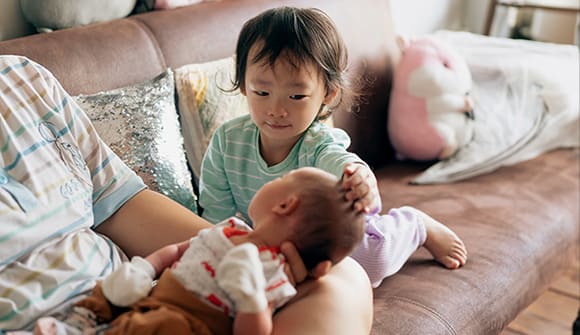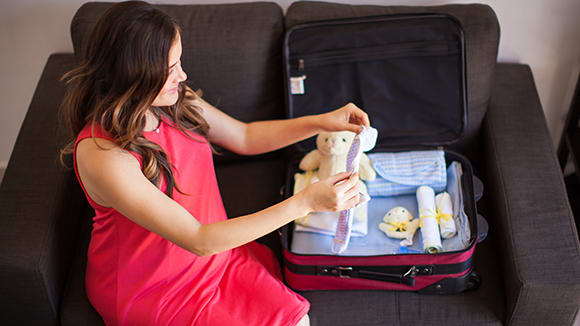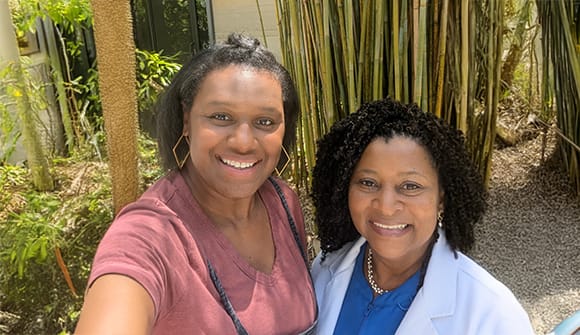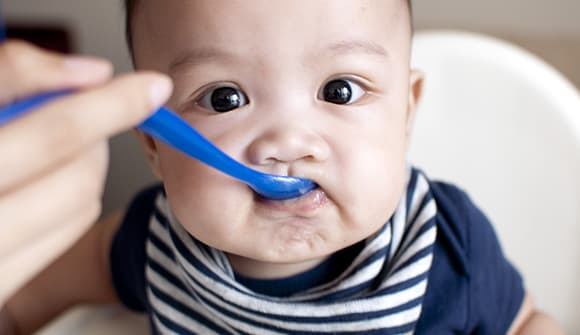Becoming a big sibling
Tips to help your older child adjust to a new baby.
Article Date:

Expecting a baby is a joyous time for moms and dads as they prepare to welcome a new addition to the family. It's exciting to get ready for the arrival and, understandably, the process of getting things in order can sometimes keep parents more focused on the upcoming event rather than the status quo.
But an existing child may not be as excited about getting a new baby brother or sister. Splitting the attention doesn't sound appealing – we all know how much children love to share, right?
Set sibling expectations
It's important for parents to be aware of the potential feelings their older one may have before the baby is born, said Julia "Jill" Garrett, PsyD, licensed psychologist and director of The Motherhood Space, Baptist Health's maternal mental wellness program.
For a toddler (between 2 and 3 years old), try to start an age-appropriate conversation to set expectations about what a new baby needs, like frequent feedings, diaper changes, being held and lots of sleep. Then explain that these were all things the older child once required, too.
"Take the time to reminisce with your toddler about when he or she was a baby," Dr. Garrett said. "Make this an experience you can share together. Look at pictures, talk about your baby shower and your first days and months as a family."
Include the older sibling
When the baby does arrive, you can try asking family members to bring a small gift for the new big sib so he or she feels celebrated and included, too. It's a good idea to keep some on hand for times when visitors arrive with something just for the baby.
The key is to make the big brother or sister feel included. And, believe it or not, toddlers love to help! Asking your older child if he or she wants to carry the diaper bag, sing to the baby, hold the baby or help with bathtime can foster a sense of belonging and get him or her accustomed to the new family dynamic.
"This is a huge change for the new siblings, who often are still really babies, themselves," Dr. Garrett said. "Sometimes, older children will show their frustration by throwing tantrums, acting aggressively toward the baby, or even pretending to be a baby, themselves. This is expected and, in most cases, temporary."
Set one-one-one time
"I encourage parents who are in the midst of big transitions, like having a new baby, to dedicate some special one-on-one time with the big kid," said Dr. Garrett. "During this special time, put phones away, allow the big sib to choose what they would like to play, follow their lead during play, and enjoy! You'll be excited to see how just some short and dedicated attention (and opportunities for control!) can impact big brother or sister."
Having an aunt, uncle or grandparent spend time with your older child on special outings gives you a break and time to rest when the baby is sleeping. It also gives your older little one something to look forward to that's just for them.
Or, you can ask a trusted relative to watch the newborn baby for a little while so you and your older child can have some one-on-one time. Even just a little time devoted to the big sib can make a big difference in his or her feelings and behavior.
Make sure to take care of yourself, too.
If you're struggling with stress, anxiety or other mental health concerns while expecting or shortly after having a baby, The Motherhood Space may be a good fit for you. To learn more, call 904.376.3800 and select option 4.



